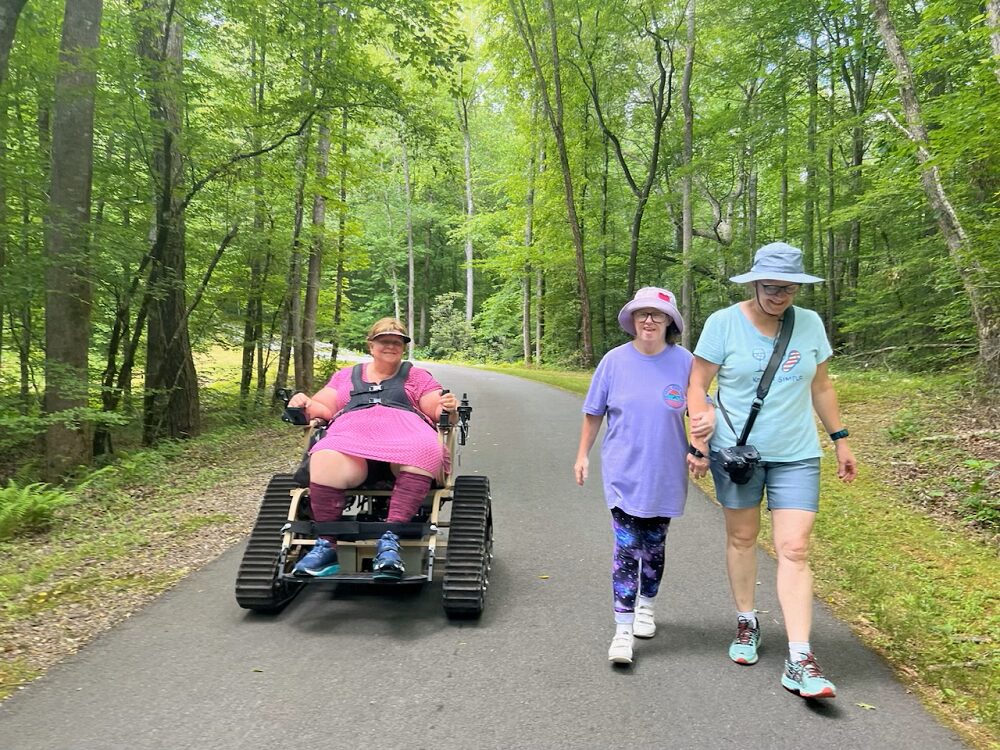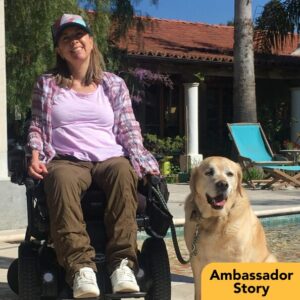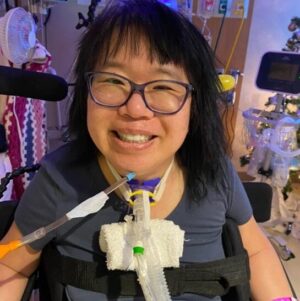The community of 60-year-old Roberta Anderson turned to Help Hope Live for spinal cord injury fundraising in 2021.
As we continue to recognize Spinal Cord Injury Awareness Month, learn how Roberta’s injury has impacted her sister and caregiver Helen Buttery.

Roberta has always been a giver.
Nursing was that for her: giving back, taking care of people. Before she became a hospice nurse, she worked with the University of Miami’s transplant unit, serving as a steward for something so precious: to help others live.
Her life has given her a unique perspective following her own spinal cord injury.

Roberta sees things from a medical perspective, so she is able to better direct her own care; however, it also frustrates her. She can no longer help with things she wants to help with, such as taking care of our aging parents–though she was still able to help support our father’s passing last year by coordinating his hospice care.
A day in our life includes a lot of hours spent together.
Getting up, getting dressed, brushing teeth, putting on her clothes, doing her hair—we do everything together for the first few hours of each day.

Then I leave for my full-time job. I come back to get her ready for bed, and we talk about the day, then wrap up by watching something together on TV.
Before Roberta’s injury, we would sometimes go days or weeks without seeing each other.
We were involved in each other’s lives, but we didn’t necessarily know all the details. Today, we know all the details—the good and the bad—and together, we’ve learned to roll with the punches.
For me, the biggest challenge of being a caregiver is knowing I can’t do everything. Some days, I’m tired, and I would give anything just to be able to stay in bed and sleep in. I am almost 60 years old, and I wonder if I’m going to be able to take care of my sister forever.

We look at options, but financially, securing more care or a different living situation is just not doable. I feel like it’s my responsibility to keep Roberta out of a nursing home. That’s a big load to carry, and it drains me. Sometimes, I’m emotionally empty, and I just don’t have any more to give. But I have to keep going and keep giving.
The challenge is how to stay pleasant when I don’t feel pleasant on the inside. I try to remember in those moments that Roberta would give anything just to be able to use her hands again, or to walk across the room and pick something up on her own.

As a caregiver, you have to care for yourself first.
I can’t take proper care of Roberta until I take care of me. I used to jump up first thing and run to her in the morning, but now, I brush my own hair and teeth first.
I encourage taking time out from each other. Financially, it’s not always possible to hire a caregiver to cover my role—but twice each year, I am able to get away with my husband and hire a caregiver. Those times are important.
Even though it is more challenging for her when she is without me, I feel both she and I are better for it.
On the other hand, the most rewarding thing about being a caregiver is helping Roberta have a better life. Without my help, both physically and financially, she might have to stay in bed.

When she was injured, I stayed with her every day in the hospital and in rehabilitation. I worked from the hospital room so I could keep my job. It’s nice that I could do that for her.
I often wish I could do more, but I know everything I do makes her life better.

The financial impact of her injury reached us right away. Covering hospital bills and getting Roberta to a good rehab facility took a lot of money, not to mention what was required just to get her home again and into the house.
She needed a ramp installed, and some of the doors were not wide enough for a wheelchair to fit through, so there were financial considerations immediately.
There is so much loss with a spinal cord injury. We were processing so much.
First, you lose what you used to take for granted, including the ability to earn an income.
Next, every single thing you do every day has to be different.

On top of that, figuring out the financial burden is just overwhelming. The truth is that every time I left the hospital, I would cry. Sometimes, I had to stop my car because I couldn’t drive.
Our first big financial burden was an accessible vehicle to get Roberta home from the hospital. We had no way to get one without help.
We found someone who rebuilt salvage vehicles into wheelchair vans who could secure a 20-year-old van for $15,000.
We started fundraising with Help Hope Live, and we were able to raise the money to get her home. People really surprised me with what they were willing to give.
Over time, we’ve also been able to offset the cost of a power chair, bathroom modifications, medications, and more through fundraising.
I liked the fact that Help Hope Live helped other people, and that if we raised more than we needed, the funds could be made available to other campaigns. Over time, I’ve realized the financial burden is greater than we understood, so our fundraising efforts are ongoing.
Our biggest expense today is simply the cost of everyday living.

Medications, co-pays, and deductibles are so difficult while receiving disability benefits. We had to buy a new van—the one we bought only lasted two years before it broke down—and those van payments are over $650 per month.
We use a standing frame to get Roberta into and out of bed. The wheels broke off from consistent use.
Two replacement wheels will cost $145.
It’s a minimum of $120 per day to hire a respite caregiver to help Roberta get out of bed and dressed, which means for me to go away for one week, it’s $840.
It is hard to ask for help, but for anyone dealing with a recent SCI, my advice is to let people do things. Often, people want to help, but they don’t know how.

Donating is one way to help, but they may be able to provide something other than financial help—share on social media if having a few dinners made would take some pressure off. No one knows what to do for you on their own, so give them some examples, from doing laundry to going shopping for you to cutting your bushes.
People will step up, but you have to ask. It helps them give, and it gives you a break.
An SCI can be isolating. In our case, Roberta doesn’t go out in the community unless it is with family members, and she needs a wheelchair van just to make a trip out.
One of the challenges after an injury like Roberta’s is that after an initial hospital-and-rehab period, people go on with their lives. They assume you’ve got it all figured out.
The initial response is great, but after that, the silence can be deafening.
People go back to their own lives, which I understand. It would be nice to be remembered, but often it’s out of sight, out of mind.

If everyone we knew could do one thing for us once per year, it would be an overabundance in our lives.
I think it’s important to celebrate Spinal Cord Injury Awareness Month because this injury creates such a hardship on injured individuals and their families. Sharing what life with SCI is like helps advocate for this community, both financially and emotionally.
If I had one wish for Roberta’s future, I would want her to get a job doing something that valued her brain. It would give her a sense of purpose and belonging.
That’s what hope means to me—wishing for a future that is a little better, and a little easier, for those who have been affected by SCI.

Make a donation in Roberta’s honor and keep up with Helen’s fundraising efforts at helphopelive.org.











